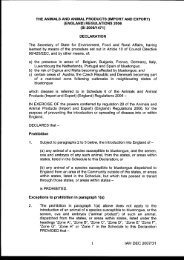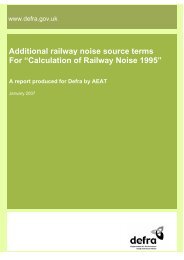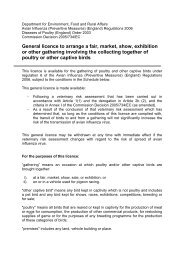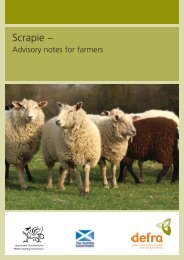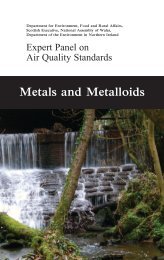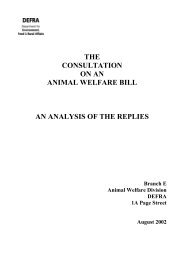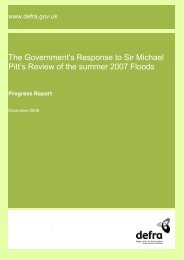Farming in the Uplands - ARCHIVE: Defra
Farming in the Uplands - ARCHIVE: Defra
Farming in the Uplands - ARCHIVE: Defra
You also want an ePaper? Increase the reach of your titles
YUMPU automatically turns print PDFs into web optimized ePapers that Google loves.
Environment, Food and Rural Affairs Committee: Evidence Ev 11<br />
27 October 2010 Dr Stuart Burgess and Professor Mark Shucksmith<br />
Professor Shucksmith: These are our<br />
recommendations 6.4, 6.5 and so on. These were very<br />
much ideas developed by one of our colleagues,<br />
Howard Petch, who you may know. He was extremely<br />
worried to f<strong>in</strong>d that, <strong>in</strong> his view and I th<strong>in</strong>k we all<br />
share this view, <strong>the</strong>re was no comparable research and<br />
development go<strong>in</strong>g on <strong>in</strong>to advanc<strong>in</strong>g hill farm<strong>in</strong>g,<br />
compared with what <strong>the</strong>re had been <strong>in</strong> lowland<br />
farm<strong>in</strong>g. One aspect of that would be <strong>the</strong> fact that<br />
<strong>the</strong>re is now no longer an experimental husbandry<br />
farm. There used to be <strong>the</strong> Redesdale Experimental<br />
Husbandry Farm. He was worried also that <strong>the</strong>re<br />
seems to be no degree-level courses <strong>in</strong> hill farm<strong>in</strong>g <strong>in</strong><br />
any of <strong>the</strong> colleges. He felt, and this was confirmed<br />
by people who we spoke to, that <strong>the</strong>re was a lack of<br />
research and development specifically <strong>in</strong>to hill<br />
farm<strong>in</strong>g practices and <strong>the</strong> tra<strong>in</strong><strong>in</strong>g of future<br />
generations of hill farmers.<br />
Stuart Burgess: I’ve been around most of <strong>the</strong><br />
agricultural colleges <strong>in</strong> this country, and I know that<br />
Howard Petch and o<strong>the</strong>rs have felt very strongly that<br />
one land-based college should take <strong>the</strong> lead <strong>in</strong> all this<br />
and be particularly concerned with <strong>the</strong> future of hill<br />
farm<strong>in</strong>g. I know <strong>the</strong>re has been a lot of concern over<br />
<strong>the</strong> potential loss of Newton Rigg for example, up <strong>in</strong><br />
Cumbria, because some people had identified that as<br />
a way <strong>in</strong> which a land-based college, set <strong>in</strong> Cumbria<br />
as well, could be used for apprenticeships and tra<strong>in</strong><strong>in</strong>g<br />
<strong>in</strong> hill farm<strong>in</strong>g. There’s a sense that potential and<br />
opportunity could now be lost. We must look for o<strong>the</strong>r<br />
opportunities, because I th<strong>in</strong>k it is about education. It<br />
is about <strong>the</strong> realisation that many young farmers, and<br />
I’m very committed to young farmers—I th<strong>in</strong>k <strong>the</strong>re<br />
are some fantastic people out <strong>the</strong>re—have grasped <strong>the</strong><br />
idea of a new bus<strong>in</strong>ess acumen, and are really go<strong>in</strong>g<br />
for it. I come across so many young farmers who want<br />
to spend <strong>the</strong>ir time up on <strong>the</strong> hills, which for many<br />
people may sound very strange and very odd, but<br />
some people are very committed to this. How are we<br />
go<strong>in</strong>g to facilitate that? How are we go<strong>in</strong>g to help<br />
that? How are we go<strong>in</strong>g to make sure that <strong>the</strong>re is<br />
some k<strong>in</strong>d of succession go<strong>in</strong>g on <strong>in</strong> <strong>the</strong> future? The<br />
idea of promot<strong>in</strong>g a land-based agricultural college,<br />
which would specialise and put great emphasis upon<br />
<strong>the</strong> tra<strong>in</strong><strong>in</strong>g, <strong>the</strong> resourc<strong>in</strong>g and especially provid<strong>in</strong>g<br />
apprenticeships, we thought, would be a marvellous<br />
opportunity.<br />
Q44 Neil Parish: One of <strong>the</strong> problems, and it goes<br />
around and around <strong>in</strong> circles, is <strong>the</strong> <strong>in</strong>come of hill<br />
farmers is low. You have statistics of £10,000.<br />
Farmers and young farmers don’t go <strong>in</strong>to it just for<br />
<strong>the</strong> money. On <strong>the</strong> o<strong>the</strong>r hand, <strong>the</strong>y have to have a<br />
liv<strong>in</strong>g for <strong>the</strong>ir families. That’s one of <strong>the</strong> problems,<br />
and it’s probably because colleges aren’t provid<strong>in</strong>g <strong>the</strong><br />
courses because <strong>the</strong> students aren’t necessarily <strong>the</strong>re.<br />
Somehow or o<strong>the</strong>r, we have to stimulate that whole<br />
th<strong>in</strong>g. Do you have any ideas on that one?<br />
Stuart Burgess: I know this is difficult but it can be<br />
achieved <strong>in</strong> areas where some people get <strong>the</strong> hill<br />
farmers to diversify, and many of <strong>the</strong>m have<br />
diversified. In <strong>the</strong> more remote areas of <strong>the</strong> hill<br />
farm<strong>in</strong>g community, it’s more difficult to do that. In<br />
<strong>the</strong> not so remote areas <strong>in</strong> <strong>the</strong> uplands, diversification<br />
has helped enormously, and some of <strong>the</strong> young<br />
farmers are <strong>the</strong> pioneers <strong>in</strong> all this also. They diversify<br />
only, for example, if <strong>the</strong>y have good broadband access<br />
and mobile phone coverage. This facilitates and this<br />
helps build up <strong>the</strong>ir bus<strong>in</strong>esses and so on. Many<br />
people <strong>in</strong> hill farm<strong>in</strong>g, yes, are hill farm<strong>in</strong>g, but <strong>the</strong>y<br />
want to do o<strong>the</strong>r th<strong>in</strong>gs also and <strong>the</strong>y realise that. It is<br />
a bit of a chicken-and-egg question. On <strong>the</strong> o<strong>the</strong>r<br />
hand, what we’ve tried to say <strong>in</strong> our report is <strong>the</strong>re is<br />
huge potential out <strong>the</strong>re, and it’s long-term potential<br />
as well as short-term potential or medium-term<br />
potential. I say broadband and CAP reform are maybe<br />
short term and medium term. Longer term, we’re <strong>in</strong>to<br />
carbon storage and water sequestration, which may<br />
help fund and ma<strong>in</strong>ta<strong>in</strong> those young hill farmers, who<br />
we desperately want <strong>in</strong> <strong>the</strong> future <strong>in</strong> England.<br />
Q45 Neil Parish: One f<strong>in</strong>al po<strong>in</strong>t on it: who will pay<br />
for <strong>the</strong> college? How are you go<strong>in</strong>g to fund <strong>the</strong><br />
college?<br />
Stuart Burgess: There’s a sense <strong>in</strong> which many of<br />
<strong>the</strong>se agricultural colleges, as people around <strong>the</strong> room<br />
will be aware, have already diversified. For example,<br />
you can go to Bishop Burton College near Beverley,<br />
which is diversification personified. What <strong>the</strong>y’re<br />
say<strong>in</strong>g <strong>the</strong>re is, where <strong>the</strong>y’re mak<strong>in</strong>g <strong>the</strong> money, for<br />
example <strong>in</strong> equ<strong>in</strong>e, that will subsidise areas to which<br />
<strong>the</strong>y f<strong>in</strong>d it more difficult to attract students, for<br />
example, or provide bursaries. This is part of <strong>the</strong> total<br />
package, ra<strong>the</strong>r than say<strong>in</strong>g we can’t possibly do it.<br />
There are opportunities and <strong>the</strong>re are ways of do<strong>in</strong>g<br />
it. Bishop Burton College is one among many, like<br />
Harper Adams, for example, that are really push<strong>in</strong>g<br />
out <strong>the</strong> boat <strong>in</strong> very <strong>in</strong>novative ways. It can be done.<br />
Professor Shucksmith: Could I just add that, where<br />
<strong>the</strong>re are subjects that are regarded as vitally<br />
important to <strong>the</strong> national <strong>in</strong>terest, and <strong>the</strong> value assets<br />
of <strong>the</strong> hills and uplands may be <strong>in</strong> that category, <strong>the</strong>n,<br />
it would seem to me, that is <strong>the</strong> prime case for<br />
Government support, and I th<strong>in</strong>k that’s accepted by<br />
this Government, as it was by <strong>the</strong> past Government.<br />
There’s a question about what are <strong>the</strong> th<strong>in</strong>gs that are<br />
deemed worthy of support, but I th<strong>in</strong>k that’s important<br />
to say.<br />
EMBARGOED ADVANCE COPY:<br />
Not to be published <strong>in</strong> full, or part, <strong>in</strong> any form before<br />
00.01am GMT Wednesday 16 February 2011<br />
Q46 Chair: How easy do you th<strong>in</strong>k it is for new<br />
entrants to come <strong>in</strong>to hill farm<strong>in</strong>g and upland<br />
farm<strong>in</strong>g? In my experience, nearly all <strong>the</strong> people at<br />
<strong>the</strong> local Askham Bryan College are those who are<br />
sons and daughters of farmers, but <strong>the</strong>re are strands<br />
and <strong>the</strong> media do follow some of <strong>the</strong> good news<br />
stories. How easy is it for new entrants to enter <strong>in</strong>to<br />
hill farm<strong>in</strong>g or upland farm<strong>in</strong>g generally?<br />
Stuart Burgess: I don’t th<strong>in</strong>k it’s particularly easy. We<br />
ought to be up front about this. Hav<strong>in</strong>g said that, and<br />
we talked a good deal about this, we need to make<br />
hill farm<strong>in</strong>g attractive. We have to make farm<strong>in</strong>g<br />
attractive per se, across <strong>the</strong> board, for <strong>the</strong> future, but<br />
particularly hill farm<strong>in</strong>g, for which we realise <strong>the</strong>re<br />
are particular disadvantages. Some people would<br />
name it as such, <strong>in</strong> terms of liv<strong>in</strong>g <strong>in</strong> sparse rural<br />
communities, for example, without many of <strong>the</strong><br />
services. On <strong>the</strong> o<strong>the</strong>r hand, what are <strong>the</strong> great<br />
potentials out <strong>the</strong>re? There are many, <strong>in</strong> terms of <strong>the</strong><br />
sheer quality of life issues that people have spoken to<br />
me about and <strong>the</strong> <strong>in</strong>novation that young people are



